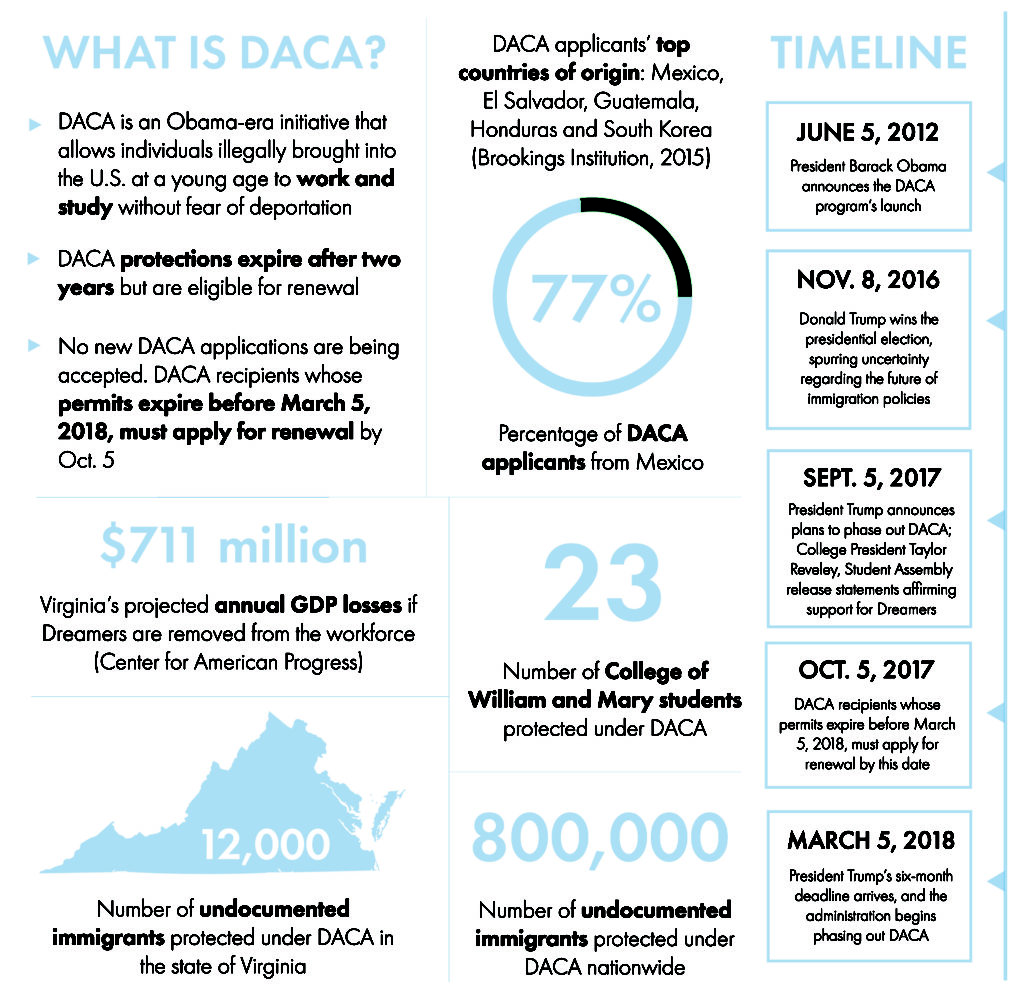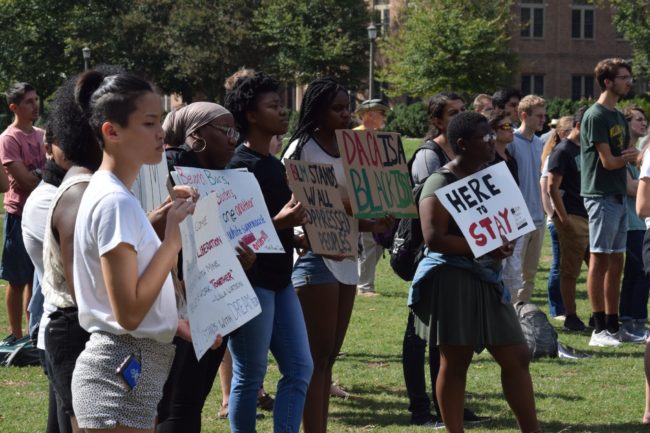Following U.S. President Donald Trump’s Sept. 5 decision to phase out the Deferred Action for Childhood Arrivals program, or DACA, the future of 23 College of William and Mary students protected under the act is uncertain. However, members of the community, from College President Taylor Reveley to Student Assembly President Elijah Levine ’18, as well as other campus leaders, have mobilized in support of those affected.
Former U.S. President Barack Obama launched DACA, an initiative that allows individuals illegally brought into the United States at a young age to work and study without fear of deportation, in 2012. 800,000 immigrants collectively known as “Dreamers” are currently protected under the act.
Trump’s decision is the latest in a tenure marked by a tightened border control and immigration policies, including a January executive order that banned visitors from seven predominantly Muslim countries, part of a vetting plan he formed to keep out “radical Islamic terrorists.” Now, lawmakers have six months to pass a suitable replacement for DACA. However, if the currently gridlocked Congress fails to create an alternative plan in this highly debated pursuit, then the Trump administration will phase out DACA.
Because of their uncertain immigration status, recipients of DACA are reluctant to be identified publicly. The Flat Hat spoke to one of the 23 College students protected under DACA, a junior who arrived in the United States at age four, regarding his experience, but in order to protect his privacy he will remain anonymous.
When the student received DACA during his senior year of high school, it had a dramatic effect on his plans for the future — instead of entering the workforce directly after graduation as he expected, he was able to attend college.
“It sounds exaggerated, but it gives you a sense of purpose,” he said. “Because without that you really have no short or long-term goals. I could have graduated high school with my 4.0 GPA, and everyone would have assumed that I’d go on to college, but no, I would … be taking jobs in construction, gardening, restaurants, and it’s not like I would have been paid minimum wage either. There would have been back door deals, [and] obviously I would have been exploited. That’s really hard. That’s something that really affects your self-worth and how you view yourself.”
Equipped with his first official U.S. ID card, the student enrolled at the College and immersed himself in newly available opportunities. He said he dreams of going to graduate school and eventually working with young immigrants, who he hopes to inspire with his own story of overcoming adversity.
For most of his college career, the student kept his immigration status private, but in the aftermath of Trump’s election, he said he felt obligated to speak out. Within the Dreamer community at the College, there was a strong sense of helplessness coupled with fear, as the student said he and others struggled to make sense of Trump’s presidency.
I knew I was protected under DACA,” he said. “However, my family members are not, and knowing that this man made public declarations that he was going to target groups of people [was] an attack on my family.”
“I knew I was protected under DACA,” he said. “However, my family members are not, and knowing that this man made public declarations that he was going to target groups of people [was] an attack on my family.”
As the Trump administration took office, Dreamers faced widespread uncertainty. The threat of deportation, both for themselves and their friends and family, became an urgent concern, but the junior said that support offered by the College alleviated some of this stress.
School officials contacted those protected under DACA and offered them resources including a Counseling Center support group, an online information hub and assistance from a local law firm.
The junior said that Reveley’s public declaration of support, as well as a similar statement released by the Student Assembly, further demonstrated that the College community values Dreamers.
In a Sept. 5 campus-wide statement following Trump’s decision about DACA, Reveley echoed sentiments he first shared after Trump’s election.
“[DACA students] belong here, and we strongly believe they should be allowed to finish their educations,” Reveley said in an email. “William & Mary will keep doing all we can to support them.”
After Trump’s announcement, activist groups on campus mobilized in a show of solidarity with Dreamers. Students gathered at the Sunken Garden Friday Sept. 8 to attend a rally organized by the Latin American Student Union and the Young Democratic Socialists with support from groups including Amnesty International, the Asian American Student Initiative, Lambda and VOX.
One of the event organizers, Billy Bearden ’19, said that the reason for the event was to show support for students currently protected under DACA.
The purpose of the rally itself is to show [DACA students] they’re not alone,” Bearden said. “There are 23 DACA recipients but 6,000 William and Mary students who are willing to stick up for them.”
“The purpose of the rally itself is to show [DACA students] they’re not alone,” Bearden said. “There are 23 DACA recipients but 6,000 William and Mary students who are willing to stick up for them.”
AASI Co-Director Andrea Ayres ’18 added that many members of her organization are first- or second-generation immigrants, and this personal connection motivates their advocacy on behalf of undocumented immigrants.
Moving forward, Ayres said she hopes students voice their outrage over DACA’s rescindment to the administration, as well as to their state representatives.
Bearden agreed with this call for activism, saying that there are many potential responses that move beyond sentiment.
The DACA student offered an additional course of action: promoting discourse in hopes of increasing tolerance.
“We feel as though we need to assimilate, and there’s nothing wrong with assimilation, but by assimilating we do give up a lot of what makes us different,” he said. “By providing this discourse, we … can create a very different way of thinking, which is what we need right now. We don’t need assimilation, we need tolerance. We need to tolerate our neighbor because we’re all human beings [and] we all have the same values.”
The future of DACA, and the country’s 800,000 Dreamers, remains unclear. Individuals whose DACA protections expire before March 5, 2018, can apply for a renewal, but applications must be submitted by Oct. 5.
The junior’s protections expire just after graduation.
With plans to attend graduate school and become a social worker in jeopardy, his future rests largely on the outcome of Congress’ efforts to replace DACA.
“Right now, there’s a lot of hope,” he said. “I guess it just comes down to [whether Congress] can do something before time runs out for a lot of people.”
Dreamers may not be able to rely on the government’s aid, but as Reveley reaffirmed, the 23 DACA students at the College have the community’s full support.
“What the federal government will ultimately do with the DACA program remains unknown,” he said in an email. “What is known is that William & Mary will continue to provide our DACA students with all the help we can.”
Office of International Students, Scholars and Programs Director Stephen Sechrist further emphasized the College’s commitment to DACA students, saying that Trump’s declaration has not affected the services, advocacy and support available.
“Students with DACA are valuable members of our community,” he said in an email, “Not just the W&M community, but our community as a nation.”
To the junior, DACA represented a reprieve from the future he had long anticipated: hiding in the shadows of the workforce, underpaid and unrecognized by the country he had always called home.
“For the majority of our lives, the U.S. has been all that we’ve ever known,” he said. “We’re American in every sense of the word except on paper.”
He said that DACA allowed him to learn what it was like to have that invaluable word on paper, at least temporarily — but without effective legislative reform, he and the other Dreamers may be the last undocumented immigrants to experience this opportunity.


